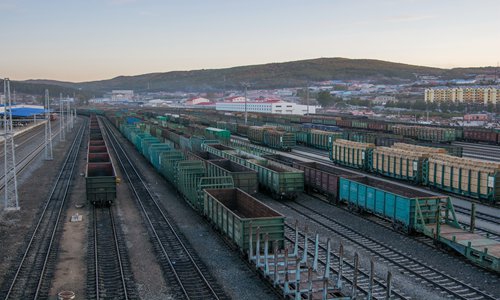
Russian freight cars containing timber in Suifenhe, a major Chinese border city with Russia, on September 26, 2018 Photo: IC
Russian companies have organized regular chartered ships to ensure that much-needed goods such as raw materials can be delivered from Russia to countries such as China and India amid a transport inadequacy due to the continuous disruption posed by the West's sanctions on Russia, industry insiders told the Global Times on Thursday.
The shipping service lines between Russia and other countries have been insufficient after most international shipping conglomerates, including Maersk, suspended container shipping to Russia over the fear of Western sanctions. China-Europe freight trains, which have been playing a resilient role in sustaining cross-continental trade, are now facing excessive demand, insiders said.
Russian freight forwarder Inteco and Swift Transport Group have jointly created liner operating subsidiaries to offer container shipping services between Vostochny in Russia's Far East and port cities in China, a person close to the matter told the Global Times on Thursday, describing it as a response to the rising demand for smooth and safe trade.
Industry information platform container-news.com said that the first service covers Vostochny, Lianyungang and Qingdao in East China and South Korea's Busan, with a two-week turnaround, while other services, using two general cargo vessels that can each carry 264 TEUs, covers Vostochny and East China's Ningbo, but can also pick up cargo at other China ports if needed.
More ships or larger charter vessels are being considered to add calls to Shenzhen, the report said.
Russia's trade with countries such as China and India have picked up significantly given the high complementarity of their economies. While Russia needs mechanical equipment and other daily commodities from China, Russian energy exports are needed in China and India.
Meanwhile, Tommy Tan, president of Shanghai EPU Supply Chain Management Co, an agent for China-EU freight trains, told the Global Times on Thursday that in the context of the surge in China-Russia trade and the suspension of Russian routes by some major international shipping companies, China-Europe freight trains have become a supply guarantee channel for transportation.
However, the China-Europe freight train has reached its ceiling in the face of the booming demand, industry insiders said, an indication of why the chartered container ships are needed.
"At present, the capacity of the China-Europe trains departing from Jining in Ulanqab [in North China's Inner Mongolia Autonomous Region], and passing through Russia has peaked, so we have to close the channel for receiving goods from other parts of China in prioritizing the delivery needs of local enterprises," an export agent surnamed Li told Global Times on Thursday.
Purefine Wood Trade Agency, a Changzhou-based trading company in East China's Jiangsu Province, which conducts trade with Russia, told the Global Times that "it's hard to find a container available these days… and the delivery time via the cargo trains has been extended by an extra week between cities in Western Russia and China, given the high demand."
The freight rate of the cross-border cargo train between China and Russia has increased by about 10 percent month-on-month since the Russia-Ukraine conflict started, with raw materials from Russia taking a big part of transportation capacity, Liu noted, adding that he is now looking for ocean container vessels to get around the train problem.
Customs offices across the country have ramped up efforts to smooth trade flows via train. For example, Jining Customs, a clearing station and hub for international freight trains in Inner Mongolia, has opened a "green channel" for timely inspection and clearance of goods upon arrival 24 hours a day, seven days a week, the Global Times learned from Jining customs.
Despite Western sanctions against Russia, China's Foreign Ministry has repeatedly stated that China opposes the unilateral sanctions and will continue normal economic and trade cooperation with Russia.

